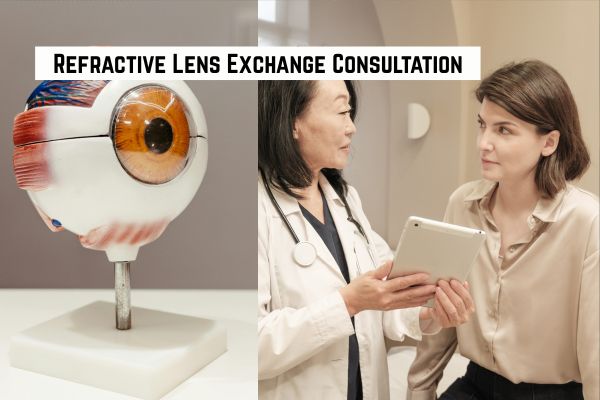Objective
This article aims to provide patients with a clear understanding of what to expect during their Refractive Lens Exchange (RLE) consultation. The consultation process is critical for determining whether Refractive Lens Surgery is the right solution for your vision correction needs. With a detailed and personalized assessment, the ophthalmologist or Refractive Lens Exchange Specialist will evaluate your eye health, discuss your visual goals and recommend the best course of action. Let’s dive into the typical process and how to prepare for your consultation.
What Happens During a Refractive Lens Exchange Consultation?
Initial Discussion: What Are Your Vision Goals?
At the beginning of your Refractive Lens Exchange Consultation, the ophthalmologist will begin by discussing your vision problems and goals. They will ask about your general eye health, lifestyle and specific concerns. This helps them understand whether Refractive Lens Surgery is the right choice and what your expectations are in terms of visual outcomes.
For example:
- Do you want to reduce dependence on glasses or contact lenses?
- Are you looking to address issues like presbyopia or age-related vision changes?
- Do you have any specific preferences for the type of intraocular lens (IOL) you would like?
Comprehensive Eye Exam: Assessing Eye Health

A comprehensive eye exam will follow, which includes several important tests to evaluate the health of your eyes and determine your suitability for Refractive Lens Exchange surgery. These tests may include:
- Visual acuity test to check how clearly you see objects at different distances.
- Pupil dilation to examine the health of the retina and optic nerve.
- Corneal mapping or keratometry to measure the curvature of your cornea.
- Tonometry to check your eye pressure.
- Refraction test to determine your exact prescription for vision correction.
- Biometry measurements to measure the size of your eye and the length of the eye, which will help in selecting the correct IOL.
These tests provide a complete picture of your eye health and help your ophthalmologist determine whether Refractive Lens Surgery is the appropriate treatment option.
Testimonials
“I would be completely happy to see this doctor again“
Discussing Surgical Options and IOL Choices
Once the ophthalmologist has reviewed your test results, they will explain the available Refractive Lens Exchange Treatment options and discuss different types of Intraocular Lenses (IOLs) that may be suitable for your needs. Depending on your goals and eye health, your surgeon may recommend one of the following IOL options:
- Monofocal IOLs: These lenses provide clear vision at one distance (near, intermediate or far).
- Multifocal IOLs: These lenses offer multiple focal points, helping to correct vision at different distances, which can reduce the need for glasses.
- Accommodating IOLs: These lenses mimic the eye’s natural focusing ability, adjusting focus at different distances.
- Toric IOLs: Designed for individuals with astigmatism, these lenses can correct both refractive errors and astigmatism.
You will have a discussion with your surgeon about the best IOL options based on your lifestyle and visual requirements.
Understanding the Risks and Benefits
At the consultation, your ophthalmologist will also take the time to discuss the potential risks and benefits of Refractive Lens Surgery. They will explain the procedure in detail, including possible side effects, such as temporary discomfort, glare, halos or dryness after surgery. Your surgeon will also outline the expected recovery process, helping you set realistic expectations for post-operative care and results.
Additionally, your surgeon will review any pre-existing health conditions or medications that could influence the surgery, such as diabetes, glaucoma or other eye conditions. This ensures that you are fully informed and prepared for the next steps.
The Cost of Refractive Lens Exchange
While cost is a key consideration for many patients, Refractive Lens Exchange Surgery can be a long-term investment in your vision and quality of life. The cost of Refractive Lens Exchange can vary depending on factors such as the type of IOL selected, your geographic location and the experience of your surgeon.
How Can You Prepare for Your Refractive Lens Exchange Consultation?
Preparation for your consultation is simple. Here are a few steps to ensure a smooth and effective meeting with your ophthalmologist:
- Bring Your Medical History: Include any eye conditions you have had in the past, current medications and any other health issues that may impact your eyes.
- Write Down Your Questions: Prepare a list of questions about the surgery, potential risks, recovery time and costs.
- Plan for the Appointment: Bring a family member or friend if needed, as they can help you retain important information shared during the consultation.
By coming well-prepared, you can ensure that all of your concerns are addressed and that you leave the consultation with a clear understanding of what Refractive Lens Surgery involves.
What Happens After Your Refractive Lens Exchange Consultation?
Following your consultation, your surgeon will provide you with information about the next steps, including scheduling the surgery, preparing for the procedure and post-operative care. Depending on your eye health and the type of IOL chosen, you may be given a timeline for your surgery and recovery process. Your surgeon may also advise you to undergo additional tests or evaluations before the surgery.
Most patients can expect to recover fairly quickly after the surgery, but your ophthalmologist will guide you on what to do during your recovery to ensure the best possible results.
Client Speaks
“Absolutely fantastic consultant I have Mr Nanavaty for almost three years. He is without doubt a professional consultant“
Conclusion:
A Refractive Lens Exchange Consultation is a crucial first step in your journey to improved vision. Understanding the procedure, assessing your visual goals and discussing the different IOL options will ensure that you make an informed decision. By asking the right questions and being fully prepared, you can have a clearer idea of what to expect from the surgery, the recovery process and the costs involved. It’s important to remember that this consultation is about tailoring the best possible solution for your unique needs and lifestyle.
